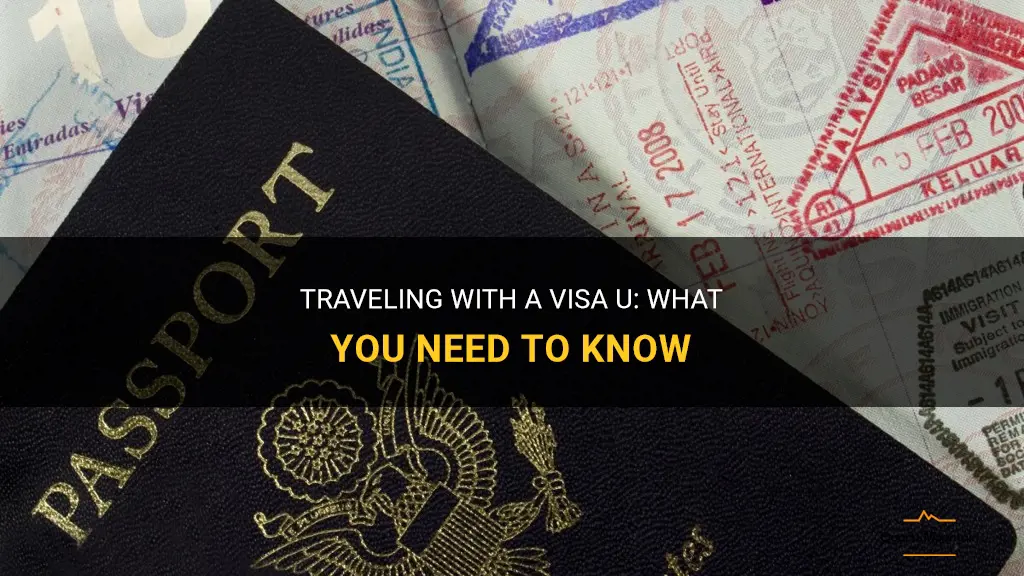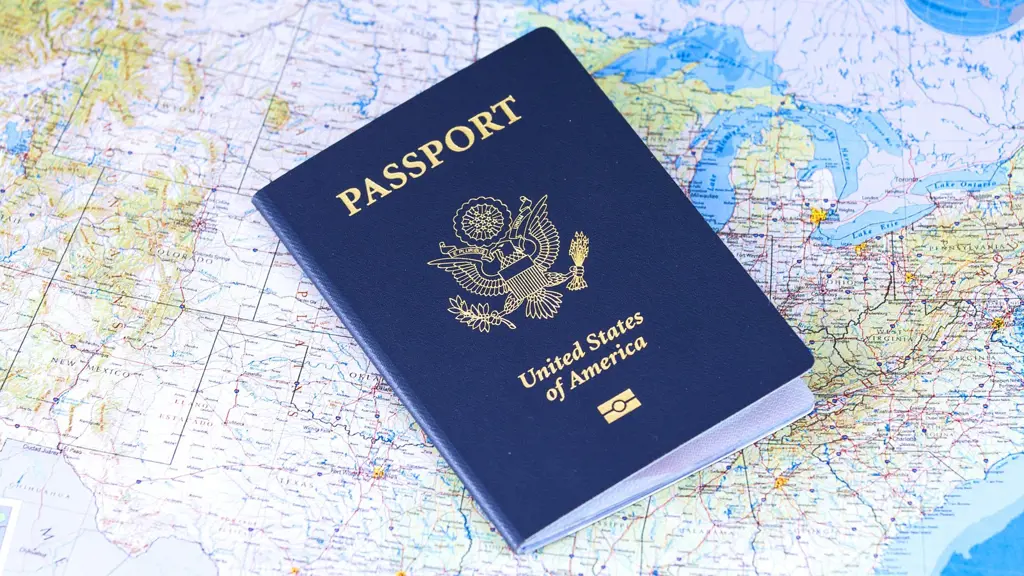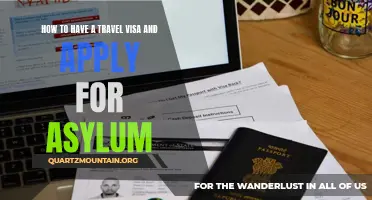
Traveling with a Visa U can be an exciting and transformative experience, granting individuals the opportunity to explore different countries and immerse themselves in new cultures. However, before embarking on this adventure, it is important to understand the specifics of traveling with a Visa U and what you need to know to ensure a smooth and hassle-free journey. From understanding the limitations and benefits of your visa to knowing the necessary documents and requirements, this guide will provide you with all the essential information you need for traveling with a Visa U. So grab your passport and get ready for an unforgettable adventure!
What You'll Learn
- What is a Visa U and how does it differ from other types of visas?
- Can I travel internationally with a Visa U?
- Are there any restrictions or limitations on traveling with a Visa U?
- Do I need to apply for a separate travel document or visa to travel with a Visa U?
- Are there any specific countries or regions that have different regulations or requirements for traveling with a Visa U?

What is a Visa U and how does it differ from other types of visas?

A Visa U is a special type of nonimmigrant visa that is available to victims of certain crimes who have suffered mental or physical abuse and are cooperating with law enforcement officials in the investigation or prosecution of the crime. This visa is designed to provide protection to victims and to encourage them to come forward and seek justice.
One of the key differences between a Visa U and other types of visas is that it is only available to victims of crime. Other types of visas, such as work visas or student visas, are available to individuals for a variety of reasons, such as employment or education. The Visa U, on the other hand, is solely focused on providing legal status and protections to those who have been victimized.
Another difference is the eligibility requirements for obtaining a Visa U. In order to qualify, an individual must have suffered substantial physical or mental abuse as a result of being a victim of a qualifying crime, such as domestic violence, sexual assault, or human trafficking. They must also have sufficient information about the crime and be willing to assist law enforcement in its investigation or prosecution.
The application process for a Visa U also differs from other types of visas. Victims must submit a comprehensive application to U.S. Citizenship and Immigration Services (USCIS) that includes evidence of the crime, their cooperation with law enforcement, and any other required documentation. They must also obtain a certification from a law enforcement agency confirming their cooperation. This certification is crucial to the application process and serves as a key piece of evidence in demonstrating eligibility for the visa.
Once granted, a Visa U provides several benefits and protections to the holder. It allows them to remain in the United States legally for up to four years, during which time they can work and study. It also provides a pathway to obtaining lawful permanent residence, or a green card, after three years of continuous presence in the United States.
In summary, a Visa U is a special type of nonimmigrant visa that is available to victims of certain crimes who have experienced abuse and are cooperating with law enforcement officials. It differs from other types of visas in that it is only available to victims of crime, has specific eligibility requirements, and offers unique benefits and protections to victims. This visa is an important tool for providing assistance and support to victims of crime and encouraging their participation in the criminal justice system.
Essential Tips for Traveling to Dammam with an Umrah Visa
You may want to see also

Can I travel internationally with a Visa U?

Visa U is a nonimmigrant visa category available to victims of certain crimes who have been helpful in the investigation or prosecution of the criminal activity. It is designed to protect individuals who have suffered substantial physical or mental abuse as a result of the crime. While the primary purpose of the Visa U is to provide victims with immigration relief and access to crime victim benefits, it also allows them to travel internationally under certain circumstances.
To travel internationally with a Visa U, there are a few important factors to consider:
- Passport: In order to travel internationally, you must have a valid passport from your home country. It is essential to ensure that your passport is not expired and has sufficient validity for the duration of your intended travel.
- Advance Parole: Victims with a pending application for a Visa U can apply for Advance Parole, which allows them to travel outside the United States temporarily. Advance Parole is necessary because traveling without it can lead to the abandonment of your pending immigration application. To obtain Advance Parole, you need to file Form I-131 with the United States Citizenship and Immigration Services (USCIS).
- Emergency Travel: In cases of emergency, victims with a Visa U can seek immediate permission to travel internationally by contacting USCIS. They may be able to expedite the processing of the Advance Parole application or issue a temporary travel document.
It is important to note that international travel with a Visa U should be carefully planned and documented. Here are some steps to ensure a smooth travel experience:
- Consult an Immigration Attorney: Before making any travel plans, it is advisable to consult an experienced immigration attorney who can guide you through the process and ensure that all necessary documentation is in order.
- Notify Law Enforcement Agency: If you plan to travel internationally, it is crucial to inform the law enforcement agency handling your criminal case. They may need to provide you with written consent to travel or additional documentation to support your travel request.
- Maintain Proof of Presence in the United States: It is crucial to keep copies of all documents proving your continuous presence in the United States, such as rent receipts, utility bills, employment records, or school enrollment papers. These documents may be required to demonstrate eligibility for Advance Parole.
- Travel Itinerary and Insurance: Prepare a detailed travel itinerary including flight bookings, hotel reservations, and any other travel arrangements. It is also advisable to obtain travel insurance to cover any unforeseen circumstances during your international travel.
- Keep Important Documents Handy: Carry all necessary documents with you, including your passport, valid Visa U approval notice, Advance Parole document (if applicable), and any supporting documents provided by law enforcement or USCIS.
- Re-entry to the United States: Before leaving the United States, it is essential to have a plan for re-entry. Make sure your Advance Parole document is valid for your intended duration of stay outside the United States. If your Advance Parole expires while you are abroad, you may encounter difficulties returning to the United States.
It is important to remember that each case may have unique circumstances and requirements. It is always advisable to consult with an immigration attorney to ensure compliance with the specific rules and regulations that apply to your situation.
Example: Maria, a victim of a serious crime, has been granted a Visa U after assisting law enforcement in the investigation and prosecution of the case. She wishes to travel to her home country to visit her family for the first time in several years. Maria consults with an immigration attorney who helps her with the necessary documentation and advises her on the travel process. With the attorney's guidance, Maria successfully applies for Advance Parole and receives permission to travel internationally. She gathers all the required documents, including her passport, Visa U approval notice, and Advance Parole document, and takes appropriate travel insurance. Maria has a smooth travel experience and is able to reunite with her family overseas. She carefully plans her return to the United States, ensuring that her Advance Parole remains valid for her intended duration of stay abroad.
In conclusion, victims with a Visa U can travel internationally under specific conditions. It is crucial to consult with an immigration attorney, follow the necessary procedures, and ensure all required documentation is in order to make your travel experience hassle-free. Remember to plan ahead, notify the relevant authorities, and maintain proper documentation throughout your travel journey.
Exploring the Possibility: Can I Conduct Business While on a Schengen Tourist Visa?
You may want to see also

Are there any restrictions or limitations on traveling with a Visa U?

Traveling with a Visa U can be a great opportunity for individuals who have been victims of crime and have assisted law enforcement in the investigation or prosecution of the crime. However, it is important to note that there are some restrictions and limitations when it comes to traveling with this visa. In this article, we will discuss some of these restrictions and provide information on how to navigate them.
One of the main restrictions of traveling with a Visa U is the need to obtain a Travel Authorization Document. This document, also known as a I-131A, is required for individuals with a Visa U who want to travel outside of the United States. To apply for this document, you need to complete and file Form I-131A with the U.S. Citizenship and Immigration Services (USCIS). There is a fee associated with this application, so it is important to plan accordingly.
Once you have obtained the Travel Authorization Document, it is important to keep in mind that there may be limitations on the duration of your travel. The document will specify the dates during which you are allowed to travel, and it is crucial to adhere to these dates. If you overstay your authorized travel period, you may encounter problems when reentering the United States.
It is also important to note that the Visa U does not guarantee entry into other countries. While the United States grants you permission to travel, it is ultimately up to the other countries to decide whether or not to admit you. It is advisable to check with the embassy or consulate of the country you plan to visit to determine what their entry requirements are for individuals with a Visa U.
Additionally, it is important to be aware of any potential risks or dangers associated with traveling to certain countries. The U.S. Department of State regularly updates its travel advisories, which provide information on safety and security conditions in various countries. It is essential to review these advisories before planning your trip and to take appropriate precautions to ensure your safety while abroad.
In summary, traveling with a Visa U comes with certain restrictions and limitations. It is necessary to obtain a Travel Authorization Document and adhere to the specified travel dates. It is also important to be aware that entry into other countries is not guaranteed and to check the entry requirements of the country you plan to visit. Lastly, it is crucial to stay informed about the safety and security conditions of your destination country and to take necessary precautions. By being prepared and aware of these limitations, you can ensure a smooth and successful trip with your Visa U.
Can I Travel to Costa Rica with a US Visa? Here's What You Need to Know
You may want to see also

Do I need to apply for a separate travel document or visa to travel with a Visa U?

If you have been granted a Visa U, which is a nonimmigrant visa for victims of certain crimes who have suffered substantial physical or mental abuse and are willing to assist law enforcement and government officials in the investigation or prosecution of the criminal activity, you may be wondering if you need to apply for a separate travel document or visa to travel.
The good news is that with a valid Visa U, you generally do not need to apply for a separate travel document or visa to travel. Your Visa U allows you to travel to and from the United States, as long as it is still valid. However, there are a few important things to keep in mind when planning your travel:
- Check the expiration date: Make sure that your Visa U is still valid before you make any travel plans. The expiration date of your Visa U can be found on the visa stamp in your passport.
- Check the entry restrictions: Depending on your specific circumstances, there may be restrictions on your entry into certain countries. It's important to check the entry requirements of the country you plan to visit before you travel. Some countries may require you to obtain a visa or travel document in addition to your Visa U.
- Carry supporting documents: While you may not need a separate travel document or visa, it's always a good idea to carry supporting documents with you when you travel. This can include your passport with the Visa U stamp, any official correspondence or documents related to your case, and any other relevant documentation.
- Consult with an immigration attorney: If you have any doubts or concerns about your travel plans, it's always a good idea to consult with an immigration attorney. They can provide you with personalized advice and guidance based on your specific situation.
It's important to note that immigration laws and requirements can change, so it's always a good idea to stay informed and up-to-date on any changes that may affect your travel plans. The U.S. Department of State and the U.S. Citizenship and Immigration Services website are reliable sources of information for any updates or changes to immigration policies.
In conclusion, if you have been granted a Visa U, you generally do not need to apply for a separate travel document or visa to travel. However, it's important to check the expiration date of your Visa U, any entry restrictions of the country you plan to visit, and carry supporting documents with you. If you have any concerns, consulting with an immigration attorney is always a good idea.
Exploring Your Options: Traveling During Visa Extension
You may want to see also

Are there any specific countries or regions that have different regulations or requirements for traveling with a Visa U?
The Visa U, also known as the U nonimmigrant visa, is a temporary visa available to victims of certain crimes who have suffered mental or physical abuse and are willing to assist law enforcement in the investigation or prosecution of the criminal activity. This visa provides victims with the opportunity to remain in the United States temporarily and receive essential services, such as medical care and social support.
While the Visa U is specific to the United States, there are certain countries or regions that have different regulations or requirements for traveling with this visa. It's important for visa holders to be aware of these variations to ensure a smooth travel experience.
One such region is the European Union (EU). The EU has a common visa policy, known as the Schengen Agreement, which allows for the free movement of people within its member states. However, when it comes to the Visa U, the rules can vary between member countries. Some countries, such as France and Germany, may allow Visa U holders to enter without a visa for a short period, typically up to 90 days. Other countries, like Italy and Spain, may require Visa U holders to apply for a specific visa to enter their territory. It is recommended for Visa U holders planning to travel to the EU to check the specific requirements of the destination country before making any travel arrangements.
Another region with differing regulations is Asia. Countries like Japan, South Korea, and Singapore generally have strict visa requirements for all visitors, including Visa U holders. These countries often require an application process and documentation supporting the purpose of the visit. It is important for Visa U holders to research and comply with the specific visa requirements of the destination country well in advance of their intended travel dates.
Additionally, it's important to consider the potential challenges faced by Visa U holders when traveling to regions with ongoing conflicts or political instability. These regions may have heightened security measures and specific visa requirements for all visitors, including Visa U holders. Examples of such regions include parts of the Middle East, Africa, and certain countries affected by armed conflict or terrorism. In these cases, thorough research and communication with the respective embassies or consulates is crucial before making any travel arrangements.
In summary, while the Visa U is specific to the United States, different countries and regions may have varying regulations and requirements for traveling with this visa. Visa U holders should be proactive in researching and understanding the specific visa requirements of their intended travel destinations to ensure a smooth and hassle-free travel experience. Consulting with embassies or consulates and allowing ample time for the visa application process is highly recommended.
Exploring Travel Possibilities: Can I Visit Canada with an American Visa?
You may want to see also
Frequently asked questions
Yes, if you have been granted a Visa U, you can travel internationally. However, it is important to note that the Visa U is specific to the United States and provides temporary legal status for victims of certain crimes who have cooperated with law enforcement. While you can travel with a Visa U, it is always recommended to consult with an immigration attorney or the United States Citizenship and Immigration Services (USCIS) before making any travel plans to ensure compliance with the terms of your visa.
Traveling with a Visa U should not affect your immigration status as long as you meet the conditions of the visa and follow all relevant immigration laws and regulations. However, it is important to note that if you have any pending applications or petitions with USCIS, leaving the United States may have an impact on the processing of those applications. It is always advisable to consult with an immigration attorney or USCIS before making any travel plans to minimize any potential risks to your immigration status.
The Visa U is typically granted for a period of up to four years. During this time, you are allowed to travel internationally. However, it is important to note that the Visa U is a temporary visa, and if you plan to leave the United States for an extended period of time, you should consult with an immigration attorney or USCIS to ensure that you are in compliance with the terms of your visa. Additionally, it is essential to keep in mind that the Visa U is specific to the United States, and you may face challenges reentering the country if you are unable to provide the appropriate documents or if your visa has expired.
Yes, you can apply for permanent residency, also known as a green card, while traveling with a Visa U. The Visa U is a nonimmigrant visa, but it does provide a path to permanent residency through a process called Adjustment of Status. It is crucial to consult with an immigration attorney to understand the eligibility requirements and the process for applying for permanent residency while in the United States on a Visa U. It is also important to note that traveling internationally while your permanent residency application is pending may have implications for the application process, and it is advisable to consult with an immigration attorney or USCIS before making any travel plans.







